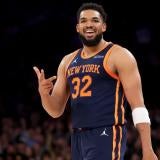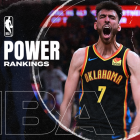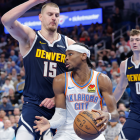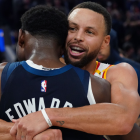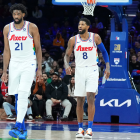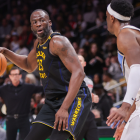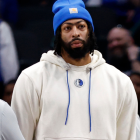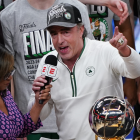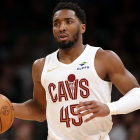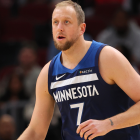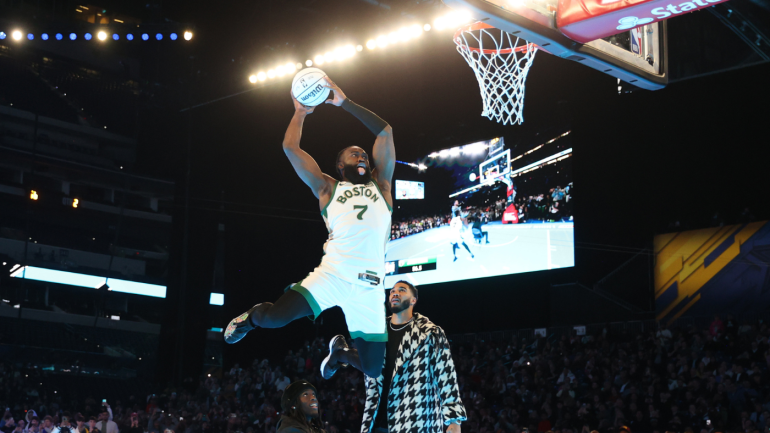
You could point to half a dozen possible reasons for the success of Saturday's one-on-one shootout between Stephen Curry and Sabrina Ionescu. Most of them would likely fall back to the "who." Curry is the greatest shooter in the history of basketball. Ionescu is a rising WNBA star. Pitting them against one another generated an easy story. The entire event was billed around them, not the shooting itself.
It creates a compelling contrast with the Slam Dunk Contest, because the "who" of what was once All-Star Weekend's signature event is the popular explanation for its steady decline. Jaylen Brown was the first All-Star to compete in the event since 2017 on Saturday. A year ago, its supposed savior wasn't even an NBA player. Now the Mac McClung dynasty has no end in sight, and another G-Leaguer, Jacob Toppin, divided the field evenly between the two leagues.
"Stars don't want to compete in the Dunk Contest" has become one of the most common refrains of All-Star Weekend. Brown's underwhelming performance on Saturday won't help matters. It will largely be remembered for how badly the judges wanted to undeservingly reward it. Judging controversies, sadly, have become all too common.
You know what wasn't common? The Curry vs. Ionescu competition. That, as much as the names themselves, is what made the event work. There was genuine novelty involved in an NBA vs. WNBA competition. We didn't know what to expect. The one-on-one nature of the contest cut the fat out of the bloated standard 3-point competition. Nobody had to pay attention to the standings and remember who was in third place. We didn't have to sit through poor showings from contestants who wouldn't advance. Just two shooters competing one-on-one in a streamlined competition with easy narrative stakes. The "who" mattered, but not as much as the "what." Curry vs. Ionescu felt new.
New hasn't always had staying power in NBA All-Star Weekend, but it has undeniably driven short-term interest. Remember the first Elam Ending? How about the first few All-Star Drafts? These tweaks didn't stick around, but they undeniably added wrinkles to what has frankly become a stale weekend. Fans don't want to see the same thing year after year after year.
And that brings us back to the Dunk Contest, because, with rare exceptions, it has become an event devoid of novelty. Consider that on Saturday, we essentially saw two separate dunk concepts repeated by different competitors. Both Mac McClung and Jaime Jaquez Jr. jumped over the same person: Shaquille O'Neal. Both Jaquez and Brown incorporated cameras being held by someone who was getting jumped over.
Simply put: we've largely run out of ideas. That makes sense. The Dunk Contest is nearly 50 years old at this point. There are only so many ways to put a ball through a hoop. With hundreds of dunks now in the rearview mirror, we've seen practically every possible iteration of the basic dunk concepts. How many through-the-legs dunks have we seen? How many 360s have been attempted? The possible combinations here are finite. Whenever a new concept is introduced, it's beaten into the ground. How many tall people have been jumped over in the past several dunk contests? A human being jumped over Shaquille O'Neal on Saturday and didn't even get a perfect score. What was once novel has now become commonplace.
Saturday introduced only one new dunk to the canon. It came when McClung released and re-caught a ball midair before slamming it down. On the surface, it doesn't seem like there's much room for growth there. The dunk only works when the dunker picks the ball out of a holder's hands midair, so already, a significant chunk of hangtime has already been used. It's also the unfortunate dunk that makes more sense on replay. McClung only got a 48 even though he was the only original dunker of the night. A one-for-16 originality score when each dunk taking several minutes with preparation included hardly makes for compelling television.
Some dunkers have sidestepped the originality problem with props. Every now and then, they genuinely succeed. Gerald Green's cupcake (the most underrated dunk in Dunk Contest history), Blake Griffin's Kia and Aaron Gordon's hoverboard stand out as successes here. But props have an even shorter shelf life than typical dunk concepts. Nobody is going roll another Kia onto an NBA court just to riff on Griffin's masterpiece.
This is the fundamental problem with the Dunk Contest today. We've seen it all, and the "who" wouldn't change that. Maybe Ja Morant could jump from slightly further back. Maybe Anthony Edwards could make a slightly crazier spin. But ultimately, the problem with the Dunk Contest is that there isn't much left that we haven't already seen, and these events rely on novelty.
Are there possible fixes? Potentially. Maybe the NBA needs to hire dunk choreographers. Perhaps there is a way to pit professional dunkers of McClung's ilk against more seasoned NBA veterans, or potentially they could be paired together in some way. Maybe the Dunk Contest shouldn't be an annual event. Odds are, if we waited three or four years between them, we'd wind up seeing newer dunks on those rarer occasions.
But yet another lackluster showing on Saturday made it clear that this is a "what" problem more than a "who" problem. An All-Star competed this time around and was mostly a dud. McClung won again but in far less convincing fashion. Until dunkers figure out how to innovate again, this event is going to keep disappointing.
![[object Object] Logo](https://sportshub.cbsistatic.com/i/2020/04/22/e9ceb731-8b3f-4c60-98fe-090ab66a2997/screen-shot-2020-04-22-at-11-04-56-am.png)




